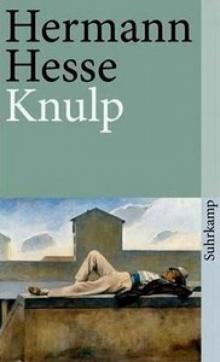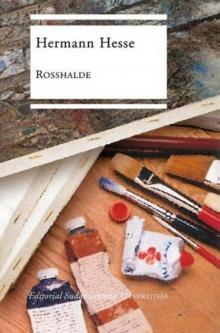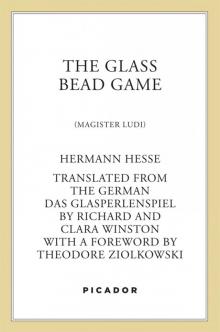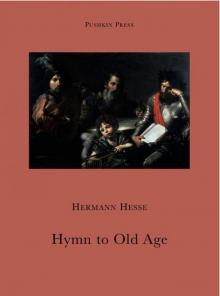- Home
- Hermann Hesse
The Glass Bead Game Page 7
The Glass Bead Game Read online
Page 7
Knecht, on the other hand, had delighted the old Music Master. He had liked him very much. As he continued his journey he recalled the boy with pleasure. He had made no notes and entered no marks for him in his notebook, but he took with him the memory of the unspoiled, modest boy, and upon his return he inscribed his name in his own hand on the list of pupils who had been examined personally by a member of the Board of Educators and been found worthy of admission.
Joseph had occasionally heard talk in school about this list, and in a great variety of tones. The pupils called it "the golden book," but sometimes they disrespectfully referred to it as the "climbers' catalogue." Whenever a teacher mentioned the list--if only to remind a pupil that a lout like him could never hope to win a place on it--there would be a note of solemnity, of respect, and also of self-importance in his voice. But if the pupils mentioned the catalogue, they usually spoke in a jeering tone and with somewhat exaggerated indifference. Once Joseph had heard a schoolmate say: "Go on, what do I care about that stupid climbers' catalogue. You won't see a regular feller's name on it, that's one sure thing. The teachers keep it for all the worst grinds and creeps."
A curious period followed Joseph's wonderful experience with the Music Master. He still did not know that he now belonged to the electi, to the flos juventutis, as the elite pupils were called in the Order. At first it did not enter his mind that there might be practical consequences and tangible effects of the episode upon his general destiny or his daily life. While for his teachers he was already marked by distinction and on the verge of departure, he himself was conscious of his call almost entirely as a process within himself. Even so, it made a clear dividing line in his life. Although the hour with the sorcerer (as he often thought of the Music Master) had only brought to fruition, or brought closer, something he had already sensed in his own heart, that hour nevertheless clearly separated the past from the present and the future--just as an awakened dreamer, even if he wakes up in the same surroundings that he has seen in his dream, cannot really doubt that he is now awake. There are many types and kinds of vocation, but the core of the experience is always the same: the soul is awakened by it, transformed or exalted, so that instead of dreams and presentiments from within a summons comes from without. A portion of reality presents itself and makes its claim.
In this case the portion of reality had been the Music Master. This remote, venerated demigod, this archangel from the highest spheres of heaven, had appeared in the flesh. Joseph had seen his omniscient blue eyes. He had sat on the stool at the practice piano, had made music with Joseph, made music wonderfully; almost without words he had shown him what music really was, had blessed him, and vanished.
For the present Joseph was incapable of reflecting on possible practical consequences, on all that might flow out of this event, for he was much too preoccupied with the immediate reverberations of it within himself. Like a young plant hitherto quietly and intermittently developing which suddenly begins to breathe harder and to grow, as though in a miraculous hour it has become aware of the law which shapes it and begins to strive toward the fulfillment of its being, the boy, touched by the magician's hand, began rapidly and eagerly to gather and tauten his energies. He felt changed, growing; he felt new tensions and new harmonies between himself and the world. There were times, now, in music, Latin, and mathematics, when he could master tasks that were still far beyond his age and the scope of his schoolmates. Sometimes he felt capable of any achievements. At other times he might forget everything and daydream with a new softness and surrender, listen to the wind or the rain, gaze into the chalice of a flower or the moving waters of the river, understanding nothing, divining everything, lost in sympathy, curiosity, the craving to comprehend, carried away from his own self toward another, toward the world, toward the mystery and sacrament, the at once painful and lovely disporting of the world of appearances.
Thus, beginning from within and growing toward the meeting and confirmation of self and world, the vocation of Joseph Knecht developed in perfect purity. He passed through all its stages, tasted all its joys and anxieties. Unhampered by sudden revelations and indiscretions, the sublime process moved to its conclusion. His was the typical evolution of every noble mind; working and growing harmoniously and at the same tempo, the inner self and the outer world approached each other. At the end of these developments the boy became aware of his situation and of the fate that awaited him. He realized that his teachers were treating him like a colleague, even like a guest of honor whose departure is expected at any moment, and that his schoolmates were half admiring or envying him, half avoiding or even distrusting him. Some of his enemies now openly mocked and hated him, and he found himself more and more separated from and deserted by former friends. But by then the same process of separation and isolation had been completed within himself. His own feelings had taught him to regard the teachers more and more as associates rather than superiors; his former friends had become temporary companions of the road, now left behind. He no longer felt that he was among equals in his school and his town. He was no longer in the right place. Everything he had known had become permeated by a hidden death, a solvent of unreality, a sense of belonging to the past. It had all become a makeshift, like worn-out clothing that no longer fitted. And as the end of his stay at the Latin school approached, this slow outgrowing of a beloved and harmonious home town, this shedding of a way of life no longer right for him, this living on the verge of departure--interspersed though the mood of parting was by moments of supreme rejoicing and radiant self-assurance--became a terrible torment to him, an almost intolerable pressure and suffering. For everything was slipping from him without his being sure that it was not really himself who was abandoning everything. He could not say whether he should not be blaming himself for this perishing and estrangement of his dear and accustomed world. Perhaps he had killed it by ambition, by arrogance, by pride, by disloyalty and lack of love. Among the pangs inherent in a genuine vocation, these are the bitterest. One who has received the call takes, in accepting it, not only a gift and a commandment, but also something akin to guilt. Similarly, the soldier who is snatched from the ranks of his comrades and raised to the status of officer is the worthier of promotion, the more he pays for it with a feeling of guilty conscience toward his comrades.
Joseph Knecht, however, had the good fortune to go through this evolution undisturbed and in utter innocence. When at last the faculty informed him of his distinction and his impending admission to the elite schools, he was for the moment completely surprised, although a moment later this novelty seemed to him something he had long known and been expecting. Yet only now did he recall that for weeks the word electus, or "elite boy," had now and again been sneeringly called out behind his back. He had heard it, but only half heard, and had never imagined it as anything but a taunt. He had taken it to mean not that his schoolmates were actually calling him an electus, but that they were jeering: "You're so stuck up you think you're an electus." Occasionally he had suffered from the gulf that had opened between himself and his schoolmates, but in fact he would never have considered himself an electus. He had become conscious of the call not as a rise in rank, but only as an inward admonition and encouragment. And yet--in spite of everything, had he not known it all along, divined it, felt it again and again? Now it had come; his raptures were confirmed, made legitimate; his suffering had had meaning; the clothing he had worn, by now unbearably old and too tight, could be discarded at last. A new suit was waiting for him.
*
With his admission into the elite, Knecht's life was transferred to a different plane. The first and decisive step in his development had been taken. It is by no means the rule for all elite pupils that official admission to the elite coincides with the inner experience of vocation. That is a matter of grace, or to put it in banal terms, sheer good fortune. The young man to whom it does happen starts out with an advantage, just as it is an advantage to be endowed with felicitous qualities of body and so
ul. Almost all elite pupils regard their election as a piece of great good fortune, a distinction they are proud of, and a great many of them have previously felt an ardent longing for that distinction. But for most of the elect the transition from the ordinary schools of their home towns to the schools of Castalia comes harder than they had imagined, and entails a good many unexpected disappointments. Especially for pupils who were happy and loved in their homes, the change represents a very difficult parting and renunciation. The result is a rather considerable number of transfers back home, especially during the first two elite years. The reason for these is not a lack of talent and industry, but the inability of the pupils to adapt to boarding-school life and to the idea of more and more severing their ties to family and home until ultimately they would cease to know and to respect any allegiance other than to the Order.
On the other hand, there were occasionally pupils for whom admission to the elite schools meant above all freedom from home or an oppressive school, from an oversevere father, say, or a disagreeable teacher. These youngsters breathed easier for a while, but they had expected such vast and impossible changes in their whole life that disillusionment soon followed.
The real climbers and model pupils, the young pedants, could also not always hold their own in Castalia. Not that they would have been unable to cope with their studies. But in the elite, studies and marks were not the only criterion. There were other pedagogical and artistic goals which sometimes proved too much for such pupils. Nevertheless, within the system of four great elite schools with their numerous subdivisions and branch institutions there was room for a great variety of talents, and an aspiring mathematician or a student of languages and literatures, if he really had the makings of a scholar, would not be misprized for a lack of musical or philosophical talent. Even in Castalia, in fact, there were at times very strong tendencies toward cultivation of the pure, sober disciplines, and the advocates of such tendencies not only denigrated the "visionaries," that is, the devotees of music and the other arts, but even sometimes went so far as to forswear and ban, within their own circle, everything artistic, and especially the Glass Bead Game.
Since all that is known to us of Knecht's life took place in Castalia, in that most tranquil and serene region of our mountainous country, which in the old days used to be called, in the poet Goethe's phrase, "the pedagogical province," we shall at the risk of boring the reader with matters long familiar once more briefly sketch the character of famous Castalia and the structure of her schools. These schools, for brevity known as the elite schools, constitute a wise and flexible system by means of which the administration (a Council of Studies consisting of twenty councilors, ten representing the Board of Educators and ten representing the Order) draws candidates from among the most gifted pupils in the various sections and schools of the country, in order to supply new generations for the Order and for all the important offices in the secondary school system and the universities. The multitude of ordinary schools, gymnasia, and other schools in the country, whether technical or humanistic in character, are for more than ninety per cent of our students preparatory schools for the professions. They terminate with an entrance examination for the university. At the university there is a specific course of study for each subject. Such is the standard curriculum for our students, as everyone knows. These schools make reasonably strict demands and do their best to exclude the untalented.
But alongside or above these schools we have the system of elite schools, to which only the pupils of extraordinary gifts and character are admitted. Entrance to them is not controlled by examinations. Instead, the elite pupils are chosen by their teachers, according to their judgment, and are recommended to the Castalian authorities. One day a teacher suggests to a child of eleven or twelve that if he wished he could perhaps enter one of the Castalian schools next semester. Does he feel attracted by the idea; does he feel any vocation for it? The boy is given time to think it over. If he then agrees, and if the unqualified consent of both parents is obtained, one of the elite schools admits him on probation. The directors and the highest-level teachers of these elite schools (by no means the faculties of the universities) form the Board of Educators, which has charge of all education and all intellectual organizations in the country. Once a boy becomes an elite pupil (and assuming he does not fail any of the courses, in which case he is sent back to the ordinary schools) he no longer has to prepare for a profession or some specialty that will subsequently become his livelihood. Rather, the Order and the hierarchy of academics are recruited from among the elite pupils, everyone from the grammar school teachers to the highest officers, the twelve Directors of Studies, also called Masters, and the Ludi Magister, the director of the Glass Bead Game.
As a rule, the last courses in the elite schools are completed between the ages of twenty-two and twenty-five. The graduate is then admitted to the Order. Thereafter, all educational and research institutions of the Order and of the Board of Educators are available to the former elite pupils, all the libraries, archives, laboratories, and so on, together with a large staff of teachers if they desire further study, and all the facilities of the Glass Bead Game. A degree of specialization begins even during the school years. In the upper ranges of the elite schools those who show special aptitudes for languages, philosophy, mathematics, or whatever are shifted to the curriculum which provides the best nourishment for their talents. Most of these pupils end up as subject teachers in the public schools and universities. They remain, even though they have left Castalia, members of the Order for life. That is to say, they stand at an austere remove from the "normals" (those who were not educated in the elite schools) and can never--unless they resign the Order--become professional men, such as doctors, lawyers, engineers, and so on. They are subject for life to the rules of the Order, which include poverty and bachelorhood. The common people call them in a half-derisive, half-respectful tone "the mandarins."
Thus the bulk of former elite pupils find their ultimate destiny as schoolmasters. The tiny remainder, the top flight of the Castalian schools, can devote themselves to free study for as long as they please. A contemplative, diligent intellectual life is reserved for them. Many a highly gifted person who for one reason or another, perhaps some physical defect or quirk of character, is not suited to become a teacher or to hold a responsible post in the superior or inferior Boards of Educators, may go on studying, researching, or collecting throughout his life as a pensioner of the authorities. His contribution to society then consists mostly of works of pure scholarship. Some are placed as advisers to dictionary committees, archives, libraries, and so on; others pursue scholarship as art for art's sake. A good many of them have devoted their lives to highly abstruse and sometimes peculiar subjects, such as Lodovicus Crudelis who toiled for thirty years translating all extant ancient Egyptian texts into both Greek and Sanscrit, or the somewhat peculiar Chattus Calvensis II who has bequeathed to us four immense folio volumes on The Pronunciation of Latin in the Universities of Southern Italy toward the End of the Twelfth Century. This work was intended as Part One of a History of the Pronunciation of Latin from the Twelfth to the Sixteenth Centuries. But in spite of its one thousand manuscript pages, it has remained a fragment, for no one has carried on the work.
It is understandable that there has been a good deal of joking about purely learned works of this type. Their actual value for the future of scholarship and for the people as a whole cannot be demonstrated. Nevertheless, scholarship, as was true for art in the olden days, must indeed have far-flung grazing grounds, and in pursuit of a subject which interests no one but himself a scholar can accumulate knowledge which provides colleagues with information as valuable as that stored in a dictionary or an archive.
As far as possible, scholarly works such as the above-mentioned were printed. The real scholars were left in almost total freedom to ply their studies and their Games, and no one objected that a good many of their works seemed to bring no immediate benefits to the people or t
he community and, inevitably, seemed to nonscholars merely luxurious frivolities. A good many of these scholars have been smiled at for the nature of their studies, but none has ever been reproved, let alone had his privileges withdrawn. Nor were they merely tolerated; they enjoyed the respect of the populace, in spite of being the butts of many jokes. This respect was founded on the sacrifice with which all members of the scholarly community paid for their intellectual privileges. They had many amenities; they had a modest allotment of food, clothing, and shelter; they had splendid libraries, collections, and laboratories at their disposal. But in return they renounced lush living, marriage, and family. As a monastic community they were excluded from competition in the world. They owned no property, received no titles and honors, and in material things had to content themselves with a very simple life. If one wanted to expend the years of his life deciphering a single ancient inscription, he was free to do so, and would even be helped. But if he desired good living, rich clothing, money, or titles, he found these things inexorably barred. Those for whom such gratifications were important usually returned to "the world" quite young; they became paid teachers or tutors or journalists; they married or in other ways sought out a life to suit their tastes.

 Beneath the Wheel
Beneath the Wheel Strange News From Another Star
Strange News From Another Star Narcissus and Goldmund
Narcissus and Goldmund Steppenwolf
Steppenwolf Siddhartha
Siddhartha Demian
Demian Knulp
Knulp Gertrude
Gertrude Rosshalde
Rosshalde The Glass Bead Game
The Glass Bead Game The Journey to the East
The Journey to the East Klingsor's Last Summer
Klingsor's Last Summer Hymn to Old Age
Hymn to Old Age Poems
Poems The Fairy Tales of Hermann Hesse
The Fairy Tales of Hermann Hesse Singapore Dream and Other Adventures
Singapore Dream and Other Adventures Soul of the Age
Soul of the Age